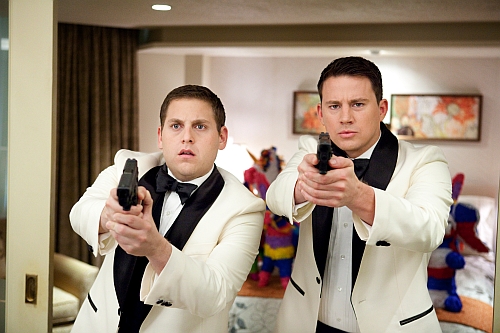by Raj Ranade
Movie remakes of old TV shows usually strike a balance between reverence for and gentle mockery of their sources – sometimes it works (the latest Star Trek), sometimes it doesn’t (nearly every other example). 21 Jump Street not only has zero interest in the former half of this equation, but it seems openly contemptuous of its own reasons for being. “We’re reviving a canceled undercover program from the 80s,” a police chief (Nick Offerman) explains to the two cops assigned to infiltrate a high-school drug ring, because “we lack creativity and we’re out of ideas”.
Directors Phil Lord and Chris Miller then proceed to extend that contempt to nearly every decision of their own. Doesn’t beefy Channing Tatum seem like an absurd choice for an undercover high-school infiltration? Sure, and every character he comes in contact with takes pains to comment on his “exceptional muscle tone”. Isn’t it weird to see Ice Cube play a police captain? Yes, and “Straight Outta Compton” blares on the soundtrack to remind you of the incongruity. It’s a fascinating spectacle to see a movie intent on consuming itself – this is part clever self-awareness a la TV’s Community and part Iggy Pop slashing himself with glass on stage.
There’s real anarchy to all this, and anarchy, fortunately, is fertile ground for comedy. I’m not going to argue that 21 Jump Street is an important film – it’s just a more-inspired-than-usual buddy-cop-comedy. But it is inspiring to see that when inane movie studio machinations come up with some source-material lemons, directors can make some pretty good lemonade (along with maybe a decent bodily fluid joke involving the lemonade).
It should be mentioned that Channing Tatum deserves as much credit as Lord and Miller, even more so than his comedy-veteran co-star Jonah Hill. Hill isn’t bad here in his Moneyball-esque role as the nerdy by-the-book cop to Tatum’s lunk-headed free-wheeler, but it clearly plays away from his strengths. Hill is possibly heir to Danny Devito as Hollywood’s new agreeably-assholish loudmouth. He’s at his best at his most abrasive, as the jabbering vulgarian in Superbad or the obnoxious six-year-old in this recent SNL skit (even in his much-praised Moneyball appearance, he’s at his best when he seems like a potential chrysalis of a jerk waiting to bloom, as towards the end of this clip). Tatum, on the other hand, is a major surprise here. Tatum rose to fame mostly through roles in sappy romantic comedies and dim-witted action blockbusters, but here he displays a refreshing lack of the ego associated with that kind of matinee idol. He’s embarassingly direct and earnest here as the not-too-bright guy slowly realizing his own potential – think a goofier Mark Wahlberg without the snarl.
Lord and Miller put these two through a series of agreeable enough action setpieces and YouTube-inflected teenage mayhem (the latter, in particular, gives you the sense that the team has spent a lot of time looking at how teens represent themselves on YouTube, unlike the flimsy all-YouTube gimmick of something like February’s Chronicle). The movie has a tendency to fall flat when it isn’t working on some kind of meta-level – I’d be OK with never even hearing the word “bromance” again, let alone seeing yet another film like this one base its emotional core on that kind of hoary male bonding. But you can’t go too long while watching 21 Jump Street without being impressed by some subversive flash of the post-modern, none as impressive as in the climax, where the directors find a way to literally put a bullet into what remains of the TV show that inspired the film. There’s been enough dutiful reverence to the past with the Oscar dominance of The Artist and Hugo – it’s refreshing to see our predecessors get mooned every once in a while too.









